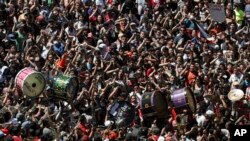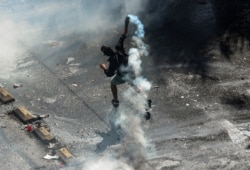Chile's government said Tuesday that 15 people have been killed in five days of rioting, arson and violent clashes that have almost paralyzed the South American country and rocked its global image as the region's oasis of stability.
About half of Chile's 16 regions remained under an emergency decree and some were a under military curfew, the first — other than for natural disasters — imposed since the country returned to democracy in 1990 following a bloody 17-year dictatorship.
Riot police used tear gas and streams of water to break up marches by rock-throwing demonstrators in several streets of Santiago on Tuesday, while military and police guarded other Chileans who formed long lines at supermarkets.
Many stores, subway stations and banks were burned, damaged or looted over the weekend, and some people have reported problems getting cash at ATMs.
The unrest was sparked by a relatively minor, less-than-4% increase in subway fares, with students jumping subway station turnstile last week in protest. But it exploded Friday with demonstrators setting fire to subway stations, buses and a high-rise building. It then spread nationwide, fueled by simmering frustration by many Chileans who say that they are not sharing in the advances of a country that is one of Latin America's wealthiest.
“The students jumped the turnstiles, and as it happens in revolutions, the elements that trigger a social phenomenon are not very rational,” said Marta Lagos, director of the polling firm Latinobarometro.
“It's not just this government'' that's to blame for the frustrations, she said. “This has been accumulating in the last four governments.”
Shortly before the rioting broke out, Conservative President Sebastian Pinera boasted in an interview with The Financial Times that Chile “looks like an oasis” in the region because it has a stable democracy, the economy continues to grow and it has been creating jobs, improving salaries and maintaining its macroeconomic balance.
But its wealth is unevenly spread, with one of the region's highest rates of inequality. Many Chilean families earn $550 to $700 a month, and pensions can be as low as $159.
“You can argue ... that we have reduced poverty, that there's no inflation these days, that the economy is controlled, etc., etc.,” Lagos said. “And all those arguments mean nothing to the people who can't make it to the end of the month.”
Jose Tomas Lopez, a cook, said he was protesting “because I've seen how my other lives, with a salary of not more than ($700) to maintain my three siblings, and I know her debts and all her efforts to meet them.
“I fight so that all that will end and so that all of us will have something fair,” he added.
After the protests erupted, Pinera rolled back the subway hike and declared a state of emergency. He later said that Chile is “at war with a powerful, relentless enemy that respects nothing or anyone and is willing to use violence and crime without any limits.” But he did not identify the enemy, and the remark brought rebukes from celebrities, politicians and soccer players.
“A war needs two sides,” Chilean soccer player Gary Medel said on Twitter. “And here, we're just one people who want equality.”
Pinera, a billionaire and former airline owner then switched to a more conciliatory tone. He said that the government is working on a reconstruction plan to cover the hundreds of millions of dollars in damaged infrastructure. Pinera also planned meetings with the opposition to explore a “social agreement” to solve “the problems that affect Chileans.”
But some leftist parties said they would boycott the meeting with Pinera to protest the nearly 10,000 soldiers patrolling the streets, part of a curfew that brings back haunting memories.
At least 3,095 suspected leftists were killed during Gen. Augusto Pinochet's 1973-1990 military dictatorship, according to government figures, and tens of thousands more were tortured or jailed for political reasons.
Most of the demonstrations have been peaceful, with people banging on pots, a common form of protest in the region.
The government says that some marches have been infiltrated by violent groups of hooded vandals who seek to destabilize the country.
Riot police also used tear gas on Tuesday to break up a group of people who tried to loot a supermarket in the Chilean capital while screaming mothers tried to get milk for their children, according to local Radio Cooperativa.
About 2 million students were also forced to stay homes from classes and many people were unable to arrive to their jobs.





